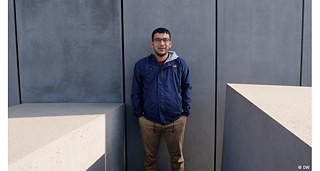14 Tage Islam in Deutschland erleben
-

Nati Sajidah Jalaluddin, Islamic Motivational Writer and Education Consultant: “I understand now is that the term secular does not necessarily imply the separation of religion and state. In Germany, the term has a neutral connotation because the 1949 Basic Law provides citizens with the freedom to profess a religion or not. The state facilitates its citizens to practice their religion, and this applies to even the most outlandish communities. In my opinion, the German approach expresses a decidedly Islamic value, which is to uphold humanity.” © Deutsche Welle
-

Husni Mubarrak, Lecturer in Sharia Law at UIN Ar-Raniry Banda Aceh: “It is important to remember the past. This country revisits its history in a number of ways. All its past experiences have led Germany to embrace religious freedom. In Indonesia, we have yet to go through such a process. I think we need to rewrite Indonesian history, because there are many aspects of local wisdom that have yet to elaborated in order to address the issue of coexistence between different religions.” © Deutsche Welle
-

Irma Wahyuni, Lecturer at STKIP Muhammadiyah Bogor: “In Germany, the government pays attention to religious education and respects diversity. In a practical context, Germany offers its citizens the free choice of how to practice their religion. This form of religious democratization is typical of Germany. Germany is a secular country, but religious freedom is highly respected.” © Deutsche Welle
-

Saipul Hamdi, Lecturer in Islamic Studies at Politeknik Pertanian Samarinda: “I am impressed with the freedom provided by the German government in regard to the expression of diversity. As long as no crime is committed, the people are free to speak out and express themselves. This leads Muslims to prefer living in a secular state rather than in an Islamic country, where many are persecuted. Islam in Germany is thriving, although lately Islamophobia is spreading.” © Deutsche Welle
-

Muhammad Heychael, Director of Remotivi and Lecturer in Media Ethics: “We have learned how Germany is facing its dark (Nazi) history. Germans do not avoid those dark memories, on the contrary, they revisit their mistakes and use the lessons learned to further humanity. Things have played out differently in Indonesia. We not only disown the events of 1965, but continue to cling to a historical narrative that justifies genocide on those accused of being communists.” © Deutsche Welle
-

Oki Setiana Dewi, Actress in religion-themed films: “An interesting thing at some of the mosques we visited was that they were open to anyone, including non-Muslims, who wanted to know more about Islam, to enable people to live side-by-side in a multi-cultural society. Muslims in Germany ought to open up because indifference and ignorance towards others only provoke prejudice.” © Deutsche Welle
-

Nur Hidayat, Postgraduate Student in Islamic Studies at UIN Surabaya, Lingkar Pena Writer: “I came to know that Germany, as a secular country, gives every citizen the freedom to adopt a religion or not. However, there are limitations as religious symbols are not allowed in state institutions. This makes me love Indonesia even more, although it is not an Islamic country, since every religion is given the freedom to celebrate or show its respective symbols.” © Deutsche Welle
-

Hazim Hamid, Lecturer in Sociology at UMSIDA, UGM Fisipol Graduate:“Germany's secular state system has led its society to adopt very rationalist principles. They have the freedom of choosing beliefs or movements according to their own outlook. Interestingly, the government also continues to provide space and support to foster religion, including Islam, both through religious communities and formal educational institutions.” © Deutsche Welle
-

Siti Maulia Rizki, MUQ-Teacher, Broadcaster at Radio Seulaweut Banda Aceh: “Originally, I was under the impression that Europeans or Germans were very individualistic, but interestingly, they are very much involved in volunteer activities. They are individualistic, but not selfish. Whatever the rationale behind it, I think as long as it’s driven by humanitarian concerns, volunteerism is the best way, also for minorities, to thrive and become accepted in Germany.” © Deutsche Welle
-

Ari Armadi, Teacher at the Islamic Boarding School Raudlatul Mubtadiin, NU Activist in Cariu-Bogor: “Based on various discussions and visits, I have come to the conclusion that the Muslim community, journalists or even the government realize the dangers of radicalism, especially among young people. Mosques have also been used to promote deradicalization. For example, the Turkish Mosque in Berlin offers a consultation program that introduces Islam as a religion of peace.” © Deutsche Welle
-

Juwita Trisna Rahayu, Antara-Journalistin: „Dieses Programm hat mich dazu geführt, den Islam in einem größeren Zusammenhang zu sehen. Meiner Meinung nach kann die religiöse Toleranz in Deutschland als Vorbild dienen. Auf der anderen Seite spielen die Medien nach wie vor eine wichtige Rolle bei der öffentlichen Meinungsbildung. Und anscheinend wird in Europa das Thema Religion immer noch genutzt um Wahlkämpfe zu gewinnen.“ © Deutsche Welle
-

Marella Al Faton, Islamic Politics Researcher at UI, Lazis Muhammadiyah Activist in Garut: “We who live outside of Europe view Germany as also discriminating against Islam, but in fact the German government actually accommodates the needs of Muslims through Islamic education in schools. This needs to be emphasized so that we understand that Germany is not against integrating Islam into the culture of the country, but that due to of its secular outlook, German Society deems religion a private matter which is not to be taken into the public sphere.” © Deutsche Welle
-

Ahmad Muttaqin © Deutsche Welle
-

Maycherlita Supandi, Graduate Student in Cultural Studies at UNAIR Surabaya: “I have seen for myself how Muslims in Germany are very careful in interpreting the Quran. They consider all aspects and examine the social, cultural, historical and even political contexts. I have yet to meet an Islamic community that faults or disparages other groups, although I think there are also contextual interpretations that have gone too far.” © Deutsche Welle